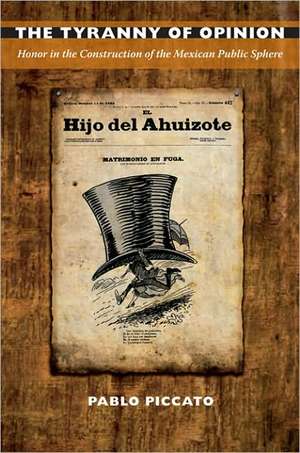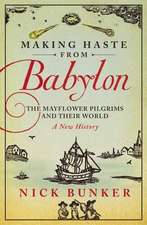The Tyranny of Opinion – Honor in the Construction of the Mexican Public Sphere
Autor Pablo Piccatoen Limba Engleză Paperback – 10 ian 2010
Preț: 304.10 lei
Nou
Puncte Express: 456
Preț estimativ în valută:
58.19€ • 61.03$ • 48.44£
58.19€ • 61.03$ • 48.44£
Carte tipărită la comandă
Livrare economică 01-15 aprilie
Preluare comenzi: 021 569.72.76
Specificații
ISBN-13: 9780822346456
ISBN-10: 0822346451
Pagini: 400
Ilustrații: 25 illustrations
Dimensiuni: 156 x 234 x 29 mm
Greutate: 0.57 kg
Editura: MD – Duke University Press
ISBN-10: 0822346451
Pagini: 400
Ilustrații: 25 illustrations
Dimensiuni: 156 x 234 x 29 mm
Greutate: 0.57 kg
Editura: MD – Duke University Press
Recenzii
The Tyranny of Opinion will likely become the definitive historical work on republican honor in Mexico and one of the most important works on republican honor and the public sphere in Latin America. With chapters on everyone from elite public men to lower-class women, the book provides exceptionally broad coverage.Robert M. Buffington, author of Criminal and Citizen in Modern Mexico
This masterful exploration of the constitution of the public sphere joins questions of gender, representational practices, class, and politics in a fascinating mosaic. It is a delightful read and an illuminating work of historical ethnography which reveals much about the difficult century between 1810 and 1910. It will help set new research agendas for modern Mexican history.Eric Van Young, author of The Other Rebellion: Popular Violence, Ideology, and the Mexican Struggle for Independence, 18101821
"The Tyranny of Opinion will likely become the definitive historical work on republican honor in Mexico and one of the most important works on republican honor and the public sphere in Latin America. With chapters on everyone from elite public men to lower-class women, the book provides exceptionally broad coverage."--Robert M. Buffington, author of Criminal and Citizen in Modern Mexico "This masterful exploration of the constitution of the public sphere joins questions of gender, representational practices, class, and politics in a fascinating mosaic. It is a delightful read and an illuminating work of historical ethnography which reveals much about the difficult century between 1810 and 1910. It will help set new research agendas for modern Mexican history."--Eric Van Young, author of The Other Rebellion: Popular Violence, Ideology, and the Mexican Struggle for Independence, 1810-1821
This masterful exploration of the constitution of the public sphere joins questions of gender, representational practices, class, and politics in a fascinating mosaic. It is a delightful read and an illuminating work of historical ethnography which reveals much about the difficult century between 1810 and 1910. It will help set new research agendas for modern Mexican history.Eric Van Young, author of The Other Rebellion: Popular Violence, Ideology, and the Mexican Struggle for Independence, 18101821
"The Tyranny of Opinion will likely become the definitive historical work on republican honor in Mexico and one of the most important works on republican honor and the public sphere in Latin America. With chapters on everyone from elite public men to lower-class women, the book provides exceptionally broad coverage."--Robert M. Buffington, author of Criminal and Citizen in Modern Mexico "This masterful exploration of the constitution of the public sphere joins questions of gender, representational practices, class, and politics in a fascinating mosaic. It is a delightful read and an illuminating work of historical ethnography which reveals much about the difficult century between 1810 and 1910. It will help set new research agendas for modern Mexican history."--Eric Van Young, author of The Other Rebellion: Popular Violence, Ideology, and the Mexican Struggle for Independence, 1810-1821
Notă biografică
Pablo Piccato
Textul de pe ultima copertă
"This masterful exploration of the constitution of the public sphere joins questions of gender, representational practices, class, and politics in a fascinating mosaic. It is a delightful read and an illuminating work of historical ethnography, which reveals much about the difficult century between 1810 and 1910. It will help set new research agendas for modern Mexican history."--Eric Van Young, author of "The Other Rebellion: Popular Violence, Ideology, and the Mexican Struggle for Independence, 1810-1821"
Cuprins
Acknowledgments xi
Introduction. Honor and the Public Sphere in the Republican Era 1
Part I. Travails of Opinion
1. Setting the Rules of Freedom: The Trajectory of the Press Jury 27
2. Representing Public Opinion: Combat Journalists and the Business of Honor 63
Part II. Tumultuous Opinion
3. "The Word of My Conscience": Eloquence and the Foreign Debt 100
4. Breaking Lamps and Expanding the Public Sphere: Students and Populacho against the Deuda Inglesa 129
Part III. Taming Opinion
5. Honor and the State: Reputation as a Juridical Good 159
6. "A Horrible Web of Insults": The Everyday Defense of Honor 188
7. "One Does Not Talk to the Dead": The Romero-Verástegui Affair and the Apogee of Dueling in Mexico 220
Conclusions 254
Notes 263
Sources Cited 337
Index 371
Introduction. Honor and the Public Sphere in the Republican Era 1
Part I. Travails of Opinion
1. Setting the Rules of Freedom: The Trajectory of the Press Jury 27
2. Representing Public Opinion: Combat Journalists and the Business of Honor 63
Part II. Tumultuous Opinion
3. "The Word of My Conscience": Eloquence and the Foreign Debt 100
4. Breaking Lamps and Expanding the Public Sphere: Students and Populacho against the Deuda Inglesa 129
Part III. Taming Opinion
5. Honor and the State: Reputation as a Juridical Good 159
6. "A Horrible Web of Insults": The Everyday Defense of Honor 188
7. "One Does Not Talk to the Dead": The Romero-Verástegui Affair and the Apogee of Dueling in Mexico 220
Conclusions 254
Notes 263
Sources Cited 337
Index 371
Descriere
Study of the nineteenth century political culture of male honor among Mexican elites and within the public sphere.
















